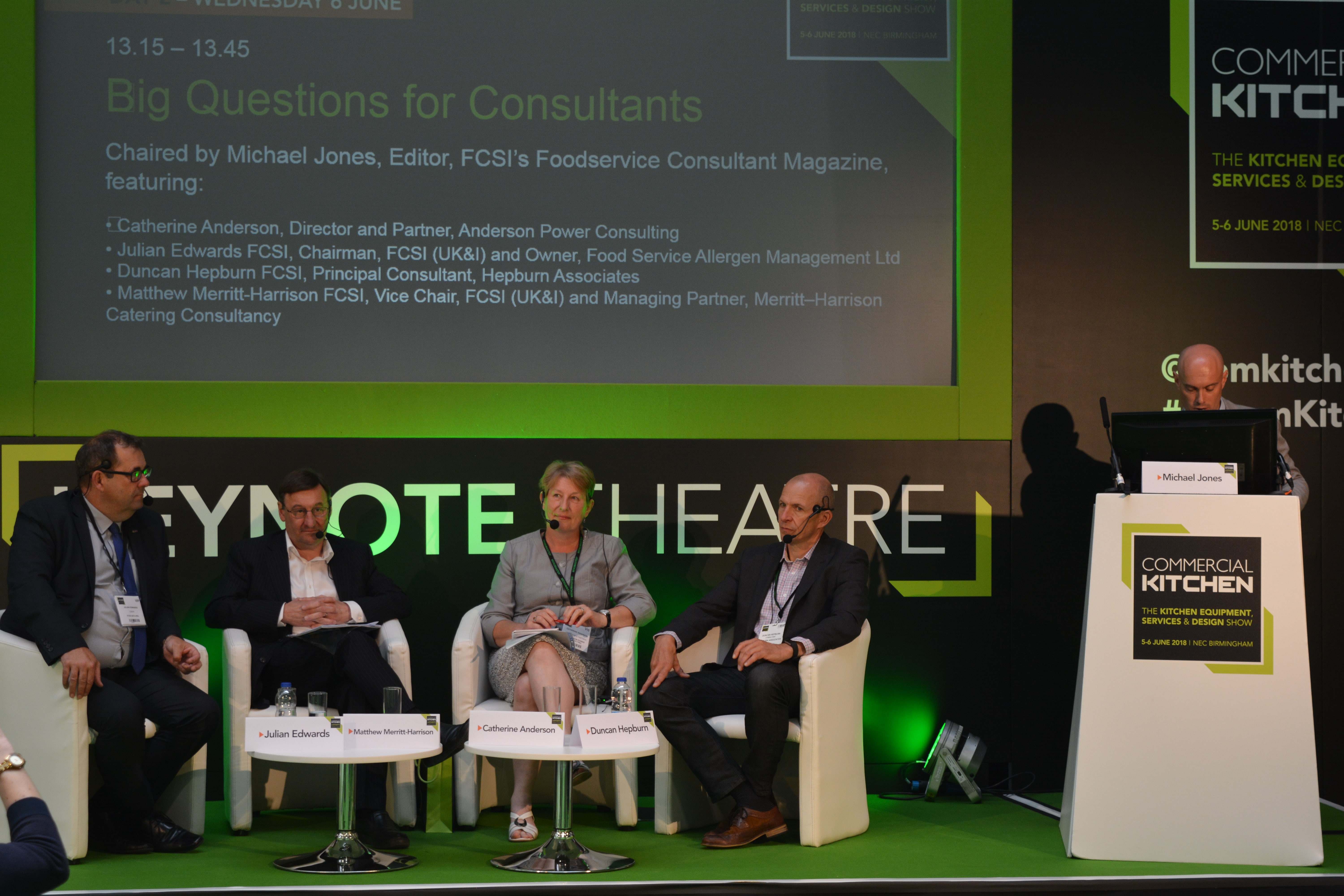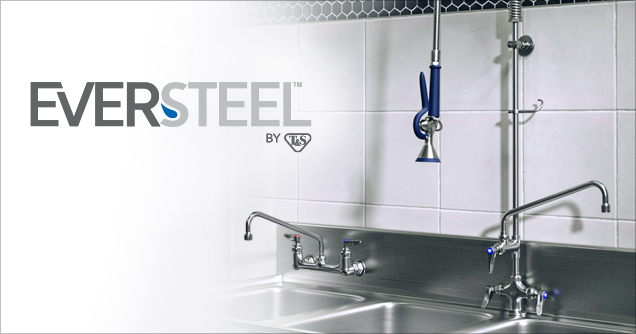
Foodservice Consultant editorial director Michael Jones chaired the panel session, which saw consultants talk about everything from Brexit and staffing challenges to food waste and single-use plastics.
The panel was made up of Julian Edwards FCSI, director of GY5 and the chair of FCSI UK & Ireland; Matthew Merritt-Harrison FCSI, managing partner of Merritt-Harrison Catering Consultancy and vice chair of FCSI UK & Ireland; FCSI senior associate Catherine Anderson, principal of Anderson Power Consulting; and Duncan Hepburn FCSI, principal consultant, Hepburn Associates.
During an insightful 30-minute session the four considered the pertinent topics currently facing consultants and the wider industry – they were not short of things to talk about. “Staffing shortage and availability of high-quality staff is a real issue in the care sector where I work a lot,” said Anderson. “Younger people don’t consider it a long-term career and in the care sector it means it is harder to keep standards high.”
Other panellists concurred on the staffing issue and, as Merritt-Harrison pointed out, it is about to get even worse when the UK fully exits the European Union in 2019. “It is bad already and it will affect everybody. The hospitality industry is going to be devastated if the UK has a mass exodus of trained workforce back to their country of origin as a result of Brexit we do not have enough adequately trained competent staff to meet the shortfall,” he said. “There will be a huge deficit in the labour market in terms of quality and quantity.”
He went on to say that his own firm has been affected already. “We used to work with the Council of Europe and for some reason the last few months they have not asked us to do any more work. I can think why that is.”
Opportunities
But Edwards noted that Brexit will also bring opportunities. “When it comes to standards on equipment design and regulating our food for the future, which is environmental health; when it comes to allergen management and compliance a lot of this intelligence that is shared in Europe was generated from the brains in Britain so for a lot of things, and certainly allergens, we will peel off the EU Kitemark and replace it with the UK Kitemark,” he said. “So where food safety and allergen safety is concerned we are already Brexit proofed.”
It is important to remember, he said, that the foodservice sector is apolitical. “We just get on with it; the government eventually will see how we behave as businesses and we won’t get scared and it can be a great opportunity,” he said.
Brexit is not the only area bringing uncertainty to the industry – in the last year the UK has seen many mid-market chains closing branches as they struggle in a climate of high overheads and a demanding dining public. According to Hepburn, those who survive this time will find there are added opportunities. “I think those that are left probably have a sound business vehicle and they will have the opportunity to upsell and strengthen their opportunity,” he said. “There probably will also be a gap in the market for new players to come in with different concepts.”
Focus on food waste
The current hot topic of food waste and food packaging was welcomed by the consultants. “It is very trendy now to jump on the bandwagon to cancel your plastic straw contract and get into recycling,” said Edwards. “This is a good thing, media can help stimulate debate and it gives us an opportunity.” FCSI has long been working as a society to promote best practice where food waste is concerned.
Anderson has seen a real focus on the issue of plastic use in public sector foodservice facilities. “I have been helping clients to look at single-use plastic throughout their restaurants, particularly in hospitals. We have tended to use a lot of disposables in the service of meals and that is changing – we are going back to crockery. It is about re-thinking the approach and one of the benefits has been you can re-invest the savings from single-use plastics in your menus and to reward staff,” she said.
It is impossible to address the future of the wider hospitality sector without mentioning technology and Jones asked the panel where they saw things going with the advance of automation. “This is a big thing; we have talked about the size of kitchens, training, losing staff and Brexit maybe it is all aligning and maybe it means we will devolve an amount of physical tasks to a machine,” said Edwards. But Merritt-Harrison said there’s a limit to the use of robotic technology. “Service delivery comes first and IT should come second,” he pointed out.
Connected kitchens
Elsewhere at the show, Andrew Seymour of Foodservice Equipment Journal chaired an insightful ‘fireside chat’ with Jack Sharkey of Vision Commercial Kitchens on the subject of ‘the connected kitchen’ and how technology can be used to drive efficiencies.
Sharkey is of the belief “both operators and manufacturers” are driving the change towards increasingly connected kitchens, although he feels the process is still in the “early stages” of adoption.
The move towards greater connection between kitchen systems, said Sharkey, is born out of the need to reduce risk in an operation, a desire for great efficiency from owner operators and an increased appetite to monitor and control the output from a commercial kitchen. Currently, said Sharkey, lots of individual pieces of equipment in a kitchen can communicate their output, notably combi-ovens and refrigeration systems – via remote monitoring – but there remains “no real collective monitoring” across the piece.
“We need a common platform,” said Sharkey, “for the information to feed into. It’s a challenge for us, but once we achieve it we will have a truly connected kitchen.”
Innovation Challenge – the winners

A total of 25 products were entered into the Innovation Challenge Awards this year at Commercial Kitchen 2018 and they impressed the judging panel.
“The standard was so high this year. Judges praised the amount of innovation on display,” said show director Chris Brazier as he implored manufacturers to “keep on innovating – the industry needs you.”
Gold
Adande Aircell Grab and Go
Carpigiani Freeze&Go
Synergy Grill Mark 2 from Synergy
Trak Hot and Cold Display Unit
EVEREO by Unox UK
Silver
FilterShield FS1500 from Environmental Products and Services
General Catering ROG Grill
Bronze
Retigo Hold-O-Mat
Shepherd Filters from Shepherd Filters UK
Target Bespoke Induction Range from Target Catering Equipment
Tina Nielsen




